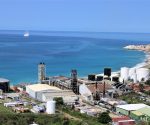Same dog …
 By Hilbert Haar
By Hilbert Haar
Same dog and not even a different hat; that is the best description I can come up with for the so-called research of UP faction leader Grisha Heyliger-Marten into the matter of decolonization.
Heyliger-Marten recently approached me with the offer to send me her research about this topic. Always ready to keep an open mind, I gave her my email address. I subsequently received an email with a link to the research, but when I clicked on it I got a message that labeled the link as suspicious. I informed Heyliger-Marten about it, saying that I was not going to use this link and asking her to send me her information through different channels. I never heard from her again.[1]
But never mind, I received the 65-page ”research” from other sources. It appears to be a lengthy document cobbled together by the disbarred attorney Denicio Brison and St. Maarten’s former Commissioner of Finance Xavier Blackman. While they made a thorough job of it – I’ll give them that – their research had nothing to do with St. Maarten but everything with Statia’s struggle with its constitutional status.
The only thing Heyliger-Marten added to the research is a letter to the President of Parliament, Rolando Brison, with the request to handle the document in a public meeting. Last Thursday, the Parliament voted in favor of sending the document to the Council of Advice. What the council will do with it is currently anybody’s guess.
Heyliger-Marten writes in her letter to Brison that to her knowledge the document was never sent to the Council of Advice – hence her request. But the first part of the document, dated May 29, 2018, is a letter to the vice-chair of the Council of Advice, the late Mavis Brooks-Salmon (erroneously addressed as ‘Mavis Salomon Brooks’). It is a reaction to a letter from former Minister Ronald Plasterk (dated June 5, 2017 – three years ago).
The letter addresses the following statement in Plasterk’s letter: “De totstandkoming en de wijziging van het Statuut zijn met inachtneming van de eisen die het Handvest stelt tot stand gekomen.” Grammar aside, Plasterk basically wrote that the Kingdom Charter does not violate any article in the United Nations Charter.
In Statia, they were not happy with that opinion. The document that is now at the Council of Advice contains 57 questions; some of them focus on Article 103 of the UN Charter, and the last question is whether the Kingdom Charter falls under its scope.
This is where it gets interesting because article 103 refers to treaties. The Kingdom Charter is not a treaty but experts still wonder whether the kingdom’s constitutional structure is in line with the right to self-determination and the decolonization right (based on article 73 of the UN Charter).
Experts in international law will have a field day with such questions. But for St. Maarten the more significant question is: what purpose does it serve to dive into this issue now while the population is going hungry? There is no money in it, for sure, and besides – decisions about constitutional status are not up to politicians; they are up to the population.
I have argued many times in the past that politicians shy away from a new constitutional referendum because they fear (or already know) the outcome. A majority will favor the status quo. And by the way, that is not something I want, because I strongly believe in a people’s right to determine its own destiny. But as long as politicians keep the door to a referendum firmly closed we will never know whether the desire for self-government a.k.a. independence has gained any ground since the 2000-referendum. (Twenty years ago almost 70 percent of the population favored becoming a country within the Kingdom of the Netherlands and 14.4 percent favored independence).
Hurricane Irma and the COVID-19 crisis have made one thing clear: St. Maarten cannot go it alone. Even without these crises the country has been incapable – to mention just one example – to bring the facilities at its prison up to standards.
So a discussion about decolonization is fine – if you don’t have anything better to do. Or I am the only one thinking that St. Maarten has more urgent problems to solve?
[1] Footnote: After I wrote this opinion, MP Heyliger-Marten sent me her research on Saturday, June 20, 2020, at 11:11 a.m. local St. Maarten time (11.11 p.m. at my current location).

























